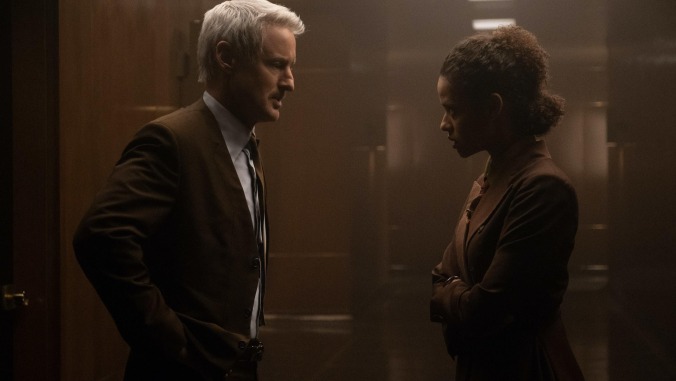Loki takes some unexpected swerves on the way to the fireworks factory
It turns out Loki is a love story—baby just say yes


In retrospect, the moment Loki started to lose
control of its story was when Sylvie blew up the Sacred Timeline at the end of episode two. That explosive cliffhanger was presented like an impossibly game-changing
shift to the show’s status quo, only to turn out to be a minor distraction
that’s had no bearing on the rest of the plot. At the time, I thought that moment was Loki blowing up its own premise in a boldly daring way. Yet here we are,
two episodes later, back in the same dimly lit TVA hallways that have defined
the show since the very beginning. Loki is starting to feel like Doctor
Who if the Doctor never left the TARDIS. It’s only some top-notch acting and an intriguing mid-credits tease that buoys this episode from a placeholder to something more tantalizing.
After an opening act that’s mostly about filling in all the
Sylvie-related specifics that should’ve been the focus of last week’s
episode, the main thrust of “The Nexus Event” is about getting Mobius and
Hunter B-15 to a place where they believe that Loki and Sylvie are telling the
truth: The TVA is staffed with mind-wiped variants. Yet while Owen Wilson and Wunmi Mosaku are both excellent at playing the slow dawning horror that Mobius and B-15 experience as their worlds are turned upside down, that also means “The Nexus Event” is a lot of
sitting around and waiting for characters to figure out stuff we already know,
which isn’t the most exciting mode for a TV show to operate in. Even a Lady Sif
cameo, a villain reveal, and several shocking “deaths”
can only do so much to jazz up the proceedings.
The main disconnect is that Loki wants to be
a show full of twists, turns, and shocking reveals, but the writing isn’t
clever enough to actually pull off that sense of mischievous fun. While I couldn’t have
specifically predicted that the Time Keepers would turn out to be mindless
androids (“Do a lot of people not know if they’re robots?”), the idea that something was off about the TVA felt like a
cornerstone of Loki’s premise. So to play that fact as a big reveal in the fourth episode without providing any additional details just feels odd. Like the “TVA agents are variants” reveal
last week or the “Ravonna is a villain” one this week, it’s a logical progression
of the TVA’s generally bad, authoritarian vibes, not the shocking twist that Loki clearly wants it to be. (I hadn’t pegged Ravonna as a villain before this, but
from the moment she hastily tells Mobius that C-20 died, it’s pretty obvious she’s not totally
on the up-and-up.)
In fact, if there’s a big shock in “The Nexus Event,” it’s not about the TVA at all; it’s that last week’s episode was apparently supposed to be a love story. While I—along with many other fans—created our own complicated theories about what sorts of tricks and illusions were actually going on under the surface of an episode about two tricksters gods wandering the apocalypse together, apparently “Lamentis” was actually just a straightforward character study about two Lokis falling for each other. And though I know I joked about the ethics of hooking up with your own variant in last week’s review, I truly meant that as a joke. At most, I thought the show was winking towards inevitable shippers. I didn’t think that Loki’s (explicitly romantic!) love for his own variant was going to become the heart of the series.
It’s a truly wild emotional anchor for the show, especially
because it’s not really introduced until the moony (and gorgeously shot) Loki/Sylvie
scene that takes place at the start of this episode. If the point of “Lamentis”
was to show Loki falling for Sylvie, surely we should’ve spent more time seeing how Sylvie’s vulnerabilities wormed their way into Loki’s heart, rather than having him be the one to do all the opening up. In fact, in retrospect, their intimate mid-apocalypse connection from this episode probably should’ve been the climax of the previous one, in order to leave us with lingering
questions about the nature of their relationship. Instead, “Lamentis” ended on a semi-comedic plot-driven cliffhanger that in no way primed us for this hard
left swerve into earnest emotionality.
Tom Hiddleston is so great at playing earnest romanticism
that it almost kind of works. (He’s quietly devastating in the moment Mobius
tricks him into thinking Sylvie has been pruned.) But I also think this is a more
seismic shift for the character than the show realizes. Loki has been pretty consistently asexual and aromantic within the MCU, which was part of the reason his random question about Sylvie’s
love life felt so jarring last week. To suddenly go all-in on a sweeping love-at-first-apocalypse story is a lot to take in. True, there’s the dark joke of a narcissist only falling in love with himself (in female form, of course, lest Disney be
required to push its queer representation too far), and part of it is that Loki is just afraid of being alone. But the earnestness
of his sudden lovesickness isn’t particularly consistent with who we know Loki to be.
And I do think we’re supposed to genuinely invest in Loki’s feelings for Sylvie—even it it’s possible that she doesn’t
return the romantic inclination. (She certainly doesn’t seem prepared for the
kiss and/or confession of love he’s about to deliver before Ravonna prunes him.) Although, to be honest, it’s also hard to know what to invest in at this
point in the show. The post-credits scene thankfully does away with any faux suspense that
Hiddleston’s Loki wouldn’t return next week. But are we supposed to genuinely
invest in Mobius’ death? Or is that just meant to feel like a tricky plot
challenge for the series to overcome too?
Maybe the answer to that question will hinge on who Mobius
turns out to be in his past life. The most interesting idea in “The Nexus Event”
comes right at the beginning, as Loki tries to comfort Sylvie as asteroids hurtle towards them: The thing that makes a Loki a Loki isn’t a godly sense of
entitlement or even a trickster’s mischievous, it’s that they always manage to
survive, no matter how many times they die. (They’re the Rory Williams of the
MCU, to complete the Doctor Who comparison.) Thor lamp-shaded as much back
in Infinity War, and Loki has turned it into its raison
d’être. And if my pet theory that Mobius is a Loki variant turns out to be
true, maybe we haven’t seen the last of the jet ski-loving company man after
all. (Or maybe everyone who gets “pruned” simply gets sent to an alternate timeline with a bunch of their own variants, who knows.)
Regardless, we’ve got some more Lokis to meet! This episode’s
mid-credits scene (the first in the series) reveals what looks to be
four new Loki variants: A kid version played by Jack Veal, an older version played
by Richard E. Grant, a weapon-wielding version played by Deobia Oparei (although
based on what weapon he’s holding, I wonder if he might actually turn out to be a
Thor variant), and a literal alligator Loki. It’s a tantalizing tease that Loki might finally
expand its world into something less confined. And while I’ve
been burned by this show’s cliffhangers before, like Mobius, I choose to live in hope
that things can change.
Stray observations
- I screamed when Lady Sif showed up! She’s one of my favorite
underused MCU players, and I really wish this episode had done more with her
than just make a time loop joke. - While Sylvie being born a girl is seemingly what marked her
as a variant, apparently there was some other mysterious “Nexus Event” that caused
the TVA to finally show up to prune her when she was a kid. (Seems sort of inconsistent
with how they’ve treated variants before, but sure!) So in addition to the
question of “Who created the TVA?” we also have the question of “What brought Sylvie
to the TVA’s attention in the first place?” - I don’t know if it was just me, but I found the Time Keepers
virtually impossible to understand without captions on. - I’m starting to wonder if COVID filming restrictions
affected this show far more than its creators let on. Surely the scene where Sylvie
shows Hunter B-15 memories of her past life was meant to be a flashback montage,
not just two women standing in a rainy parking lot. - It really can’t be overstated how much Natalie Holt’s score is
adding to the atmosphere of this show. - “How about the word of a
friend?” had
big Legolas and Gimli vibes.